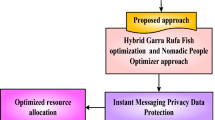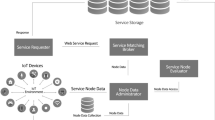Abstract
The use of cloud-edge technology creates significant potential for cost reduction, efficiency and resource management. These features have encouraged users and organizations to use intelligence federated cloud-edge paradigm in Internet of Things (IoT). Human Resource Management (HRM) is one of the important challenges in federated cloud-edge computing. Since hardware and software resources in the edge environment are allocated for responding human requests, selecting optimal resources based on Quality of Service (QoS) factors is a critical and important issue in the IoT environments. The HRM can be considered as an NP-problem in a way that with proper selection, allocation and monitoring resource, system efficiency increases and response time decreases. In this study, an optimization model is presented for the HRM problem using Whale Optimization Algorithm (WOA) in cloud-edge computing. Experimental results show that the proposed model was able to improve minimum response time, cost of allocation and increasing number of allocated human resources in two different scenarios compared to the other meta-heuristic algorithms.







Similar content being viewed by others
References
Jian, C., Li, M., Kuang, X.: Edge cloud computing service composition based on modified bird swarm optimization in the internet of things. Clust. Comput. 22, 8079–8087 (2019)
Tseng, L., Yao, X., Otoum, S., Aloqaily, M., Jararweh, Y.: Blockchain-based database in an IoT environment: challenges, opportunities, and analysis. Clust. Comput. 23, 2151–2165 (2020)
Zhao, D., Luo, L., Yu, H., Chang, V., Buyya, R., Sun, G.: Security-SLA-guaranteed service function chain deployment in cloud-fog computing networks. Clust. Comput. (2021). https://doi.org/10.1007/s10586-021-03278-4
Zhang, J., Cheng, Z., Cheng, X., Chen, B.: OAC-HAS: outsourced access control with hidden access structures in fog-enhanced IoT systems. Connect. Sci. (2020). https://doi.org/10.1080/09540091.2020.1841096
Zaman, S.K.U., Jehangiri, A.I., Maqsood, T., Ahmad, Z., Umar, A.I., Shuja, J., et al.: Mobility-aware computational offloading in mobile edge networks: a survey. Clust. Comput. (2021). https://doi.org/10.1007/s10586-021-03268-6
Zhao, H., Yao, L., Zeng, Z., Li, D., Xie, J., Zhu, W., et al.: An edge streaming data processing framework for autonomous driving. Connect. Sci. (2020). https://doi.org/10.1080/09540091.2020.1782840
Shahidinejad, A., Ghobaei-Arani, M., Souri, A., Shojafar, M., Kumari, S.: Light-edge: a lightweight authentication protocol for IoT devices in an edge-cloud environment. IEEE Consum. Electron. Mag. (2021). https://doi.org/10.1109/MCE.2021.3053543
Ali, S.A., Ansari, M., Alam, M.: Resource management techniques for cloud-based IoT environment. In: Alam, M., Shakil, K.A., Khan, S. (eds.) Internet of Things (IoT): Concepts and Applications, pp. 63–87. Springer, Cham (2020)
Mirjalili, S., Lewis, A.: The whale optimization algorithm. Adv. Eng. Softw. 95, 51–67 (2016)
Rahmani, A.M., Babaei, Z., Souri, A.: Event-driven IoT architecture for data analysis of reliable healthcare application using complex event processing. Clust. Comput. 24, 1347–1360 (2020)
Ghobaei-Arani, M., Souri, A., Rahmanian, A.A.: Resource management approaches in fog computing: a comprehensive review. J Grid Comput. 18, 1–42 (2020)
Javadpour, A., Wang, G., Rezaei, S.: Resource management in a peer to peer cloud network for IoT. Wirel Personal Commun. 115, 2471–2488 (2020)
Fu, S., Yang, F., Xiao, Y.: AI inspired intelligent resource management in future wireless network. IEEE Access 8, 22425–22433 (2020)
Domanal, S.G., Guddeti, R.M.R., Buyya, R.: A hybrid bio-inspired algorithm for scheduling and resource management in cloud environment. IEEE Trans. Serv. Comput. 13, 3–15 (2020)
Chen, C., Dai, J., Cheng, C., Huang, Z.: Retraction note to: A Resource Allocation Algorithm Based on Game Theory in UDN, in Machine Learning and Intelligent Communications, pp. C1–C1. Springer, Cham (2018)
Wu, B., Chen, X., Chen, Y., Li, Z.: An Effective Resource Allocation Approach Based on Game Theory in Mobile Edge Computing. In: Blockchain and Trustworthy Systems, pp. 385–396. Springer Nature, Singapore (2020)
Bala, M.I., Chishti, M.A.: "Offloading in cloud and fog hybrid infrastructure using iFogSim." In: 2020 10th International Conference on Cloud Computing, Data Science & Engineering (Confluence), pp. 421–426. IEEE (2020)
Jamil, B., Shojafar, M., Ahmed, I., Ullah, A., Munir, K., Ijaz, H.: A job scheduling algorithm for delay and performance optimization in fog computing. Concurr. Comput. 32, e5581 (2020)
Hou, J., Song, Z.: A hierarchical energy management strategy for hybrid energy storage via vehicle-to-cloud connectivity. Appl. Energy 257, 113900 (2020)
Li, Q., Zhao, J., Gong, Y., Zhang, Q.: Energy-efficient computation offloading and resource allocation in fog computing for internet of everything. China Commun. 16, 32–41 (2019)
Thanikavel, B., Venkatalakshmi, K., Kannan, A.: Optimized mobile cloud resource discovery architecture based on dynamic cognitive and intelligent technique. Microprocess. Microsyst. 81, 103716 (2021)
Deng, W., Xu, J., Zhao, H., Song, Y.: A Novel Gate Resource Allocation Method Using Improved PSO-Based QEA. IEEE Trans. Intell. Transp. Syst. (2020). https://doi.org/10.1109/TITS.2020.3025796
Li, X., Zhao, L., Yu, K., Aloqaily, M., Jararweh, Y.: A cooperative resource allocation model for IoT applications in mobile edge computing. Comput. Commun. 173, 183–191 (2021)
Wang, S., Tuor, T., Salonidis, T., Leung, K.K., Makaya, C., He, T., et al.: Adaptive federated learning in resource constrained edge computing systems. IEEE J. Sel. Areas Commun. 37, 1205–1221 (2019)
Razaque, A., Aloqaily, M., Almiani, M., Jararweh, Y., Srivastava, G.: Efficient and reliable forensics using intelligent edge computing. Future Gen. Comput. Syst. 118, 230–239 (2021)
Abd El Aziz, M., Ewees, A.A., Hassanien, A.E.: Whale optimization algorithm and moth-flame optimization for multilevel thresholding image segmentation. Expert Syst. Appl. 83, 242–256 (2017)
Aljarah, I., Faris, H., Mirjalili, S.: Optimizing connection weights in neural networks using the whale optimization algorithm. Soft. Comput. 22, 1–15 (2018)
Author information
Authors and Affiliations
Corresponding author
Additional information
Publisher's Note
Springer Nature remains neutral with regard to jurisdictional claims in published maps and institutional affiliations.
Rights and permissions
About this article
Cite this article
Liu, Y., Zhang, W., Zhang, Q. et al. An optimized human resource management model for cloud-edge computing in the internet of things. Cluster Comput 25, 2527–2539 (2022). https://doi.org/10.1007/s10586-021-03319-y
Received:
Revised:
Accepted:
Published:
Issue Date:
DOI: https://doi.org/10.1007/s10586-021-03319-y




